How James Fuck the Jews Baker Lined His PocketsBy Ben Caspit,
Maariv (Saturday supplement) December 15, 2006
He meddled in the Iraq quagmire (
also here,
here and even here) and made tens of millions of dollars, and then came up with the famous report on how the US should handle the Middle East situation. Nir Gouaz, an Israeli who spent years in the US, reveals how former Secretary of State James Baker employed his services in order to collect Iraq's debts to a major Korean conglomerate firm using a Jordanian bank and a Chinese middleman. All of this occurred despite UN-imposed sanctions on the Saddam Hussein administration. Baker's office: "The description of our role in this affair is not accurate."
James Baker himself is the reason why Nir Gouaz decided to break the silence: "Having read all the articles concerning Baker's ME vision, including the report itself, I realized there was no limit to the nerve (hutzpa) of the man chosen by the US to decide on the fate of this region."
The story itself is wonderful. Gouaz recalls how the main American media enticed him for years in order to expand on the bits and pieces of information they had managed to gather. At the time Gouaz, who was living in America, had no desire to get into trouble. Now that he is back in Cesarea, he feels the time is right to talk. His story has all the potential for a spy thriller movie script with all the required economical political and security elements: international relations, a tyrannical dictator, an angry superpower, businessmen at work in grey areas, a former high-ranking influential politician, oil and money. Lots of money.
Nir Gouaz returned to Israel two years ago, after a 15-year spell in the US. At 48 years-old, he has a wife and four children, the oldest serving as a paratrooper. Gouaz lives in a spacious villa and drives a tank-size American luxury car with all the extras. He's living the good life. Although he was occasionally associated with diamonds and arms deals in Sierra Leone, his name has been cleared both in America and Israel. He remains calm, relaxed and self-confident while recounting his story.
He had the time of his life in America. He lived in a huge estate on Fisher Island, the kind only the richest Miami crowd can afford. He made his money from important international business deals, mainly rescue and debt-collecting operations. He was asked to intervene when huge business operations were being blocked by problem states and he always succeeded in closing the deal - for a fee, of course – sort of a "persuader". He started out in the Israeli Secret Service Security Division, then he was involved in security issues. His personal charisma earned him important contacts.
In August 1998, he received a phone call from Jeffrey Stonerock, senior partner of the Baker Botts law firm, the American legal empire headed by former Secretary of State James Baker. This international business law firm employs hundreds of lawyers in offices all over the world.
"We have a big business deal for you", said Stonerock to Gouaz, "it's a very delicate matter only you can handle. Get on the first plane, please".
A private meeting with BakerGouaz was living in Miami at the time. The private jet that took him to Washington, DC landed at an executive only airport. The limo waiting for him drove him straight to Baker's office - 1299 Pennsylvania Avenue. Stonerock greeted him:"Come, the boss wants to talk to you". A few minutes later he was seated in James Baker's private office for a tête à tête meeting with James Baker.
"The deal in question is highly confidential", said Baker, "and we know you are a very discreet. I would like to introduce you to someone who will explain the whole thing to you." A Chinese gentleman stepped into the room and introduced himself as Do Sen Shey, a representative of CPC, an international business firm (Fortune-affiliated, apparently).
Shey told Gouaz he was well-connected in Korea and proceeded to show Gouaz a thick-bellied manila file: Hyundai's large civil engineering division had been working on vast infrastructure projects in Iraq for the past ten years. The Iraqi government had agreed on payment of over $ 800 million for the projects, in the form of government bonds, to be cashed at later dates. However, as soon as the First Gulf War broke out in 1991, the Iraqis had suspended all payments to suppliers, and Hyundai was stuck with worthless IOU's that the Iraqis refused to redeem.
Shay went on to tell Gouaz that due to interest rates and delayed payments, the outstanding debt was in excess of $ 1 billion. Which meant the collapse of the entire Hyundai Concern unless the debt was settled. Baker and Shey explained to Gouaz that unless a solution was found quickly, Hyundai was doomed. Shey revealed that Hyundai was willing to conduct indirect negotiations with the Iraqis in order to collect at least part of the debt. However, there was a catch: the world had imposed sanctions on Iraq, and the Security Council allowed trade with Iraq only under the famous oil-for-food program, which allowed for limited Iraqi oil exports (US-supervised) in exchange for food and medicine. No cash transactions were allowed.
What to do? Shey then told Gouaz that Baker's law office was the only law firm empowerment by Hyundai to conduct negotiations on its behalf. "Find us a buyer for the Iraqi bonds", was the Koreans' demand. Why Gouaz? "Firstly", he says, "because they were aware of my discreet and professional record. Secondly, I was not an American national. An American national cannot engage in bypassing a Security Council sanctions resolution. James Baker's involvement has very significant implications."
Gouaz went on to stress that the aforementioned meeting took place in Baker's private office and that he was present during the initial stages. Even after Baker had left the room, Shey and Gouaz remained seated in the sumptuous office. Gouaz wanted time to think things over. He also wanted photocopies of all the uncashed bonds, which were mailed to his home in Miami: the outstanding debt was indeed $ 830 million. Then he came up with a simple solution: only Jordan, Iraq's neighbor could provide the necessary services.
Then he phoned Jeffrey Stonerock to enquire whether Baker's office had any contacts in Jordan. "I need meetings at the highest levels", demanded Gouaz. "I need someone to open doors for me. Once they are open, I can go in and deliver the goods". "You got it", replied Stonerock. It turned out that the self-confidence of Baker's men was justified. Some time later, Gouaz was invited to meet Shakir Taufik Fakouri, president of The Bank of Jordan.
The meeting took place at the Hyatt Hotel in Jerusalem, in early 1999. Fakouri, who had no clue as to the subject of the meeting, was very courteous. Gouaz offered him the deal of a lifetime: buy Iraqi government IOU's at a great discount (around 30% of their actual value), and sell them back to the Iraqi government for oil, at great profit. All parties win: Hyundai escapes bankruptcy, the Jordanians make about 20% of the sum assuming that the Iraqis agree to provide oil in exchange for half the bonds, the Iraqi government settles a heavy debt that will allow Hyundai to continue work on Iraqi infrastructure projects. In addition, seizure will be lifted off Iraqi assets around the world.
Money flowed and so did oilFrom there on in things cascaded rapidly. A meeting was scheduled with Hyundai Civil Engineering representatives in Hong-Kong (that's where their home office was located). The meeting was attended by Gouaz, Do Sen Shey, and a Bank of Jordan team. At the same time, Fakouri was meeting Tareq Aziz, the Iraqi Minister of Foreign Affairs at the time, who held the price for which the Iraqis would redeem the government bonds.
Gaps were being bridged, but Aziz still had one condition: the oil-for-food was a good option, the deal, but the amount of oil for export would have to be increased. Fakouri went back with the news about the increased oil quota. Gouaz briefed Baker and his people about the Iraqi demands. Then, in August 1999, the Iraqi oil export quota was indeed increased. Tarek Aziz contacted with Fakouri to give him the go ahead for the deal.
Thus, with the assistance of Baker's law firm, the Jordanians bought the Iraqi government bonds off Hyundai for $ 272 million, while Gouaz and Do Sen Shey served as mediators. The bonds were then sold to the Iraqis for $ 450 million worth of oil. The Bank of Jordan netted a handsome net profit, while Baker and Botts' fee was no less than $33 million, in Gouaz's estimate. Gouaz himself admits that he also earned a nice commission.
The deal was completed in July 2000. Everyone flew to Hong-Kong to meet at the Peninsula Hotel where they signed the agreement. Hyundai Vice-President, Su-Kuang Min, who made an appearance at the final meeting, wrote Gouaz a very emotional letter of appreciation. Gouaz knows for a fact that Baker flew to Korea a few weeks later to collect his fee.
At the time, Gouaz recalls, the entire affair began to surface and the American media was showing increased interest, so Stonerock was forced to admit to a certain involvement in the negotiations.
In November 2001, two months after the WTC attack, Stonerock called Gouaz again. "Listen", he said, "you've got to destroy all documents pertaining to that deal. And we'd like you to sign our confidentiality agreement forms again."
Gouaz was cautious: "Some of the documents have been destroyed, while others are being kept in a safe location." He never signed the confidentiality forms. "I destroyed whatever needed to be destroyed", he reassured Stonerock. "But I'm keeping whatever does not need to be destroyed".
He never heard from Baker's people again. But he began to get into trouble: IRS investigations and all kinds of uncomfortable strange little things. The Hyundai deal or the Iraqi bonds were never mentioned, but Gouaz felt that his troubles were somehow connected to that deal.
In 2004 Gouaz decided to return to Israel. He has stayed silent since then. But now he needs to break the silence. This is obviously his side of the story. It is straightforward and detailed. It is also supported by documents, photographs and tapes.
As to Baker's law firm, here's Jeffrey Stonerock's statement: "Our professional ethics and client confidentiality policy prevent us from discussing our clients' affairs, yet we can confirm that Baker-Botts has never served as a mediator or provided significant legal counsel in the transaction mentioned in your letter. Your description of the role played by our firm and our connection with Mr. Nir Gouaz in 2001 is not accurate. If you have any documents that might indicate otherwise, please forward us relevant photocopies so that we can reply accordingly." (this is the general idea, since I am translating from Hebrew). James Baker has not provided a direct response so far.
What can we learn from this affair? In Gouaz' words: "When the US was spearheading the international sanctions on Iraq, the law firm of a former Secretary of State closed a super deal involving a billion dollar's worth of Iraqi government bonds at a great discount. I was personally chosen to act as mediator between buyer and seller and my commission was paid by Baker's Washington DC law office. I was designated for the job because I was not a US national, and because I was personally acquainted with highest level ME officials. I am willing to lay the cards on the table at this time, in order to reveal what hides behind Mr. Baker's vision and plans. Bottom line? It's all about the money."
(I translated this article from Hebrew, sorry for the incongruences).
 Way to go, Ben-Gurion! Israel detractors, EAT YOUR HEART OUT! And this is no mean feat in this day and age when the world is against us and our very existence is being threatened by the forces of evil!
Way to go, Ben-Gurion! Israel detractors, EAT YOUR HEART OUT! And this is no mean feat in this day and age when the world is against us and our very existence is being threatened by the forces of evil!










 Such as the one appearing on the
Such as the one appearing on the  The seven-branched candelabra was but a fraction of the exquisite mosaic floor exposed by Avshalom who used his hands literally to remove the soil and dirt covering the find. Construction work was stopped, and the Antiquities Authority arrived at the kibbutz. Excavations uncoverd an ancient synagogue.
The seven-branched candelabra was but a fraction of the exquisite mosaic floor exposed by Avshalom who used his hands literally to remove the soil and dirt covering the find. Construction work was stopped, and the Antiquities Authority arrived at the kibbutz. Excavations uncoverd an ancient synagogue.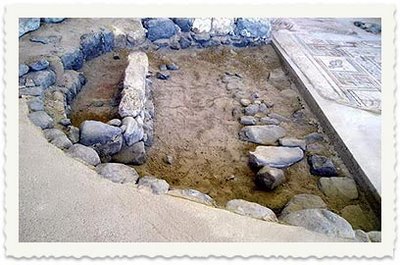 Underneath a the remains of a Bedouin cemetery, built on the ruins of an old Arab village, a Jewish town from the third century was found. The synagogue, constructed during the latter part of the century, served the Jewish community there for over 300 years, and was destroyed, along with the rest of the the town, in a large fire which broke out during the Arab occupation of the land. According to signs found in the area, the Jewish town was called Bala, and the Bedouins too kept that name.
Underneath a the remains of a Bedouin cemetery, built on the ruins of an old Arab village, a Jewish town from the third century was found. The synagogue, constructed during the latter part of the century, served the Jewish community there for over 300 years, and was destroyed, along with the rest of the the town, in a large fire which broke out during the Arab occupation of the land. According to signs found in the area, the Jewish town was called Bala, and the Bedouins too kept that name. 







 Also found at the dig: part of the tiled roof
Also found at the dig: part of the tiled roof and this elaborately crafted object:
and this elaborately crafted object: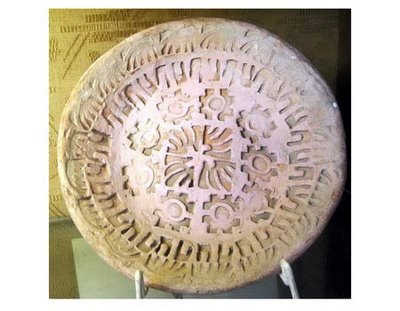
 ("rocket science" has become THE "cottage industry" of Gaza)
("rocket science" has become THE "cottage industry" of Gaza)








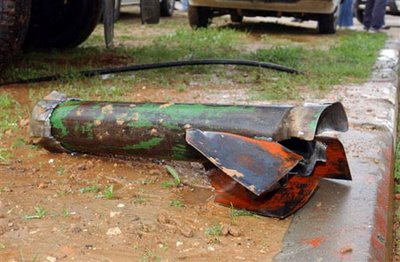







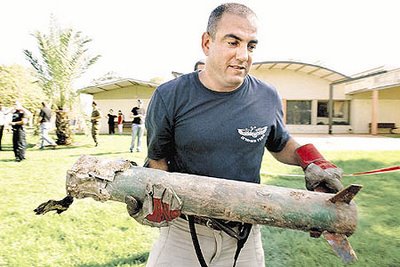

 (rockets found in a private residence in Nablus, West Bank)
(rockets found in a private residence in Nablus, West Bank)



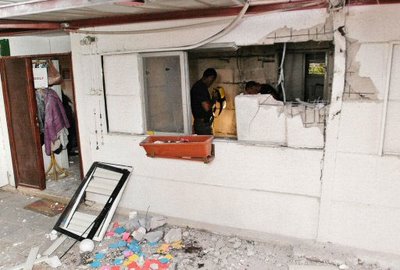
 (These are rocket-launching sites targeted by the IDF: Beit-Hanoun, Beit-Lahiya, Sheich-Ziyad, Al-Atatrah, Shuhada Cemetery, Giv'at Oranim, Officers Quarters - this last location was built to provide lodgings for Palestinian security officers).
(These are rocket-launching sites targeted by the IDF: Beit-Hanoun, Beit-Lahiya, Sheich-Ziyad, Al-Atatrah, Shuhada Cemetery, Giv'at Oranim, Officers Quarters - this last location was built to provide lodgings for Palestinian security officers). 




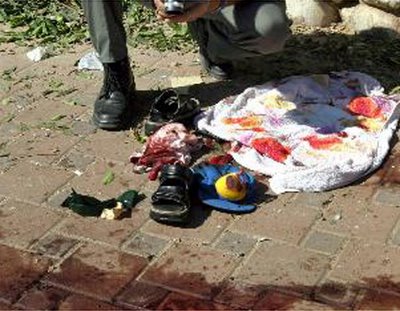
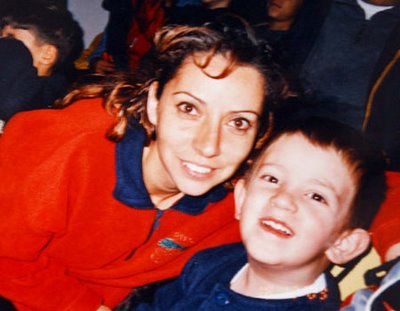
 This beautiful 17-year-old girl, Ella
This beautiful 17-year-old girl, Ella 








